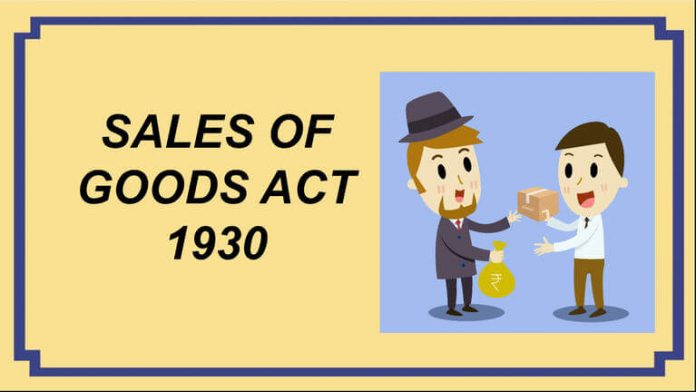This article is written by Tanisha Kohli who is pursuing a Diploma in Advanced Contract Drafting, Negotiation and Dispute Resolution from Lawsikho.
Table of Contents
INTRODUCTION
Figure 1: Conditions in a contract of sale can be express or implied. Express means given in words, whether written or oral. Implied means what can be inferred, even though the parties may not have formally agreed upon it.
A condition, defined in Section 12 of the Sale of Goods Act, 1930 (hereinafter ‘the Act’), is the soul of the contract. It is an essential aspect of the contract without which the contract is as good as useless to the buyer. This is why breach of a condition, whether express or implied, gives the buyer the right to reject the contract as if the contract has no power to bind the buyer any longer.
For example, in a contract for the sale of peas, if the seller sends beans, the seller has breached a condition of the contract.
This article is intended to serve as an introductory reading to understand implied conditions in a contract for the sale of goods. Certain implied conditions have been given in the Act.
WHEN A CONDITION IS NOT TREATED AS A CONDITION
In the following circumstances, a condition is not treated as a condition. When this happens, the condition may be treated as a warranty, or it may be excused. This is dealt with in Section 13 of the Act.
- The buyer has the option of waiving a condition or of choosing to treat a condition as a warranty. When a condition is treated as a warranty, it means that the seller cannot reject the goods if such a condition is breached.
- When the contract for the sale of goods is not severable and the goods or part of the goods have been accepted by the buyer, the breach of condition will have to be treated as a breach of warranty. However, if the contract between the parties says that breach of condition will be treated as a breach of condition, then the contract will be given effect.
- A fulfilment of a condition may be excused by law because it has become impossible to perform the condition.
IMPLIED CONDITIONS (‘IC’)
Time of payment
This is dealt with in Section 11 of the Act. The presence of a stipulation in the contract that the payment shall be made at a particular time is NOT considered as a condition.
For example
In a contract where stacks of oak were sold to the buyer, the buyer had to pay the price of the stacks of oak within 12 weeks from the date of the contract, and the stacks of oak would remain on the seller’s ground for 16 weeks.
He failed to pay and asked for more time. The seller refused to give more time. The buyer later gave the price amount, but the seller did not accept it and sold the wood to someone else. Since time is not a condition, the buyer was entitled to recover the value of the stacks of oak (Case: Martindale v. Smith, (1841) 1 QB 389).
However, this will not hold true when from a reading of the terms of the contract, it is evident that the intention of the parties was that the time of payment is an essence of the contract.
Title of the goods
This is dealt with in Section 14 of the Act. The Implied Condition as to the title of the goods may be represented as follows:
Figure 2: There is an implied condition that the seller has the right to sell the goods which he is selling and if the goods are to be sold in the future i.e. in an agreement to sell, then the seller will acquire the right to sell the goods at the relevant time when the goods are passed from the seller to the buyer.
For example
The seller sold a motor car to the buyer. After the use of the car for some months by the buyer, it was discovered that the car had been stolen. The buyer was compelled to return it to the true owner. The buyer was held entitled to recover the price from the seller. (Case: Rowland v Divall 1923 2 KB 500 (CA))
To determine whether this implied condition is relevant to a particular transaction, one also needs to check whether the contract of sale between the parties points to a conclusion, which is different from the implied condition. If the intention of the parties in the contract is different from this implied condition, then that intention prevails over the condition.
Sale by description
This is dealt with in Section 15 of the Act. The Implied Condition as to sale by description may be represented as follows:
Figure 3: Where in a contract for sale, the buyer has specified the description of the goods to be bought, there is an implied condition that the goods shall correspond with the description so given.
Description means those words in the contract which the parties intended to serve as an identifier of the kind of goods which were to be supplied. If the goods are of a different kind and do not correspond to the description of the goods in the contract, the buyer can fairly and reasonably refuse to accept the goods. This implied condition also operates when the sale is by sample as well as by description of the groups.
For example
The seller sold the “New Singer Car” to the buyer. When the car was delivered, the buyer discovered that the car was not new. In such a situation, the buyer may reject the car. (Case: Andrews Brothers Ltd v Singer & Co Ltd, [1934] 1 KB 17)
Implied conditions as to quality and fitness
This is dealt with in Section 16 of the Act. The general rule is that there is no implied condition that the goods shall be fit for a particular purpose or as to the quality of the goods. However, there are certain exceptions to this rule.
First exception
The first exception may be represented as follows:
Figure 4: The implied condition is that the goods supplied by the seller are reasonably fit for the purpose which the buyer indicated to the seller.
Where the buyer, either through words or by his conduct, makes known to the seller the particular purpose for which he is buying the goods, in order to indicate that he is relying upon the skill or Judgment of the seller, and the goods are such that, the seller supplies them in the course of his business then the implied condition comes into effect. Importantly, the seller in this scenario need not be the manufacturer or producer of the said goods.
For example
The Buyer went to the chemist who sold hot water bottles and asked for a hot water bottle. The hot water bottle burst on being filled with boiling hot water and injured his wife. It was held that it is justified to assume that the goods were bought and sold for the purpose of being used as hot water bottles. The chemist as the seller of the hot water bottle will be liable to the buyer. (Case: Priest v Last (1903)2K.B.148)
This implied condition does not operate however where the buyer does not rely upon the seller’s skill and judgment., and enters into a contract for the sale of an article under its patent or trade name, relying upon his own skill and judgment There is no implied condition that the goods shall be fit for the purpose for which he needs them.
Second exception
The second exception may be represented as follows:
Figure 5: Where the buyer describes the goods to be bought to the seller and the seller deals in goods that are of that description there is an implied condition that the goods shall be fit for sale and purchase i.e be of merchantable quality.
Here too, the seller need not be the manufacturer or producer of the said goods.
Example,
The buyer went to the hairdressing establishment of the seller and had his hair dyed by the seller. The hair dye used was recommended as good hair dye by the seller. However, because of the use of the hair dye, the buyer contracted dermatitis. The buyer was held liable for damages. (Case: Watson v Buckley, Osborne, Garrett & Co. Ltd. [1940] All ER 174.)
However, if the goods have a defect(s) that are capable of being revealed by examination of the goods, and the buyer has examined the goods, there is no such implied condition.
Third exception
The third exception is that an implied condition about the fitness or quality of the goods may operate because of trade usage.
Fourth exception
The fourth exception is that just because certain express conditions are given in a contract, that does not mean that the implied conditions provided in the Act will not operate. However, if the express condition is inconsistent with the implied condition, then the express condition will prevail.
Sale by sample
This is dealt with in Section 17 of the Act. Where the contract contains a term that the sale of goods is a sale by sample, it is considered to be a contract for sale by sample. In such a contract there are three implied conditions.
Figure 6: Firstly, there is an implied condition that the quality of the bulk of the goods shall correspond with the quality of the sample.
Figure 7: Secondly, there is an implied condition that a reasonable opportunity shall be given to the buyer to compare the bulk with the sample.
Thirdly, there is an implied condition that the goods should not have any defect which makes them unsuitable for sale or purchase. The defect should be of such a nature that it is not discernible on a reasonable examination of the sample.
For example 5 litres of ghee which was warranted as pure equal to sample. But was adulterated with 20 % of vanaspati oil. This would be a breach of the implied condition.
Conclusion
It is evident that implied conditions exist to protect the buyers’ interests. The above article has explained in simple language and through visual representation the categories of statutory implied conditions. Additional protection of the consumers’ interests may be found in the Consumer Protection Act 1986.
References
- Sale of Goods Act, 1930
- Pollock & Mulla The Sale of Goods Act, 10th ed
LawSikho has created a telegram group for exchanging legal knowledge, referrals, and various opportunities. You can click on this link and join:
https://t.me/joinchat/J_0YrBa4IBSHdpuTfQO_sA
Follow us on Instagram and subscribe to our YouTube channel for more amazing legal content.
 Serato DJ Crack 2025Serato DJ PRO Crack
Serato DJ Crack 2025Serato DJ PRO Crack











 Allow notifications
Allow notifications


